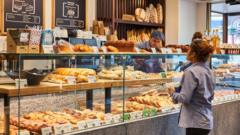As Paris Baguette gears up for ambitious international growth, it blends traditional Korean baking with global tastes, all while navigating challenges in the competitive food industry.
Paris Baguette: Redefining the Global Bakery Landscape with Korean Flair

Paris Baguette: Redefining the Global Bakery Landscape with Korean Flair
The bakery chain, rooted in Korea, is set to disrupt the global market with unique flavor profiles and expansion strategies.
Head into the bustling malls of Singapore, and the enticing aroma of freshly baked pastries is likely to draw you in. Among the myriad of bakeries—Korean, Japanese, Taiwanese, and Singaporean—one name stands out: Paris Baguette. With its vibrant décor echoing the colors of the French flag and signage reminiscent of Parisian cafes, the chain proclaims its global roots while proudly declaring its Korean heritage. "I wouldn’t confine our offerings strictly to French traditions. We are an international brand," explains Jin-soo Hur, the CEO of SPC Group, which owns the bakery chain.
SPC, which began 80 years ago as a family-owned bakery, is now a pivotal player in South Korea’s baked goods market, employing around 20,000 individuals and generating sales of $5.6 billion (£4.26 billion) in the previous year. Since its inception in 1988 as the first Korean bakery to venture into international expansion, Paris Baguette has flourished globally, boasting 4,000 locations across 14 countries. The company is eyeing substantial growth, targeting over 1,000 new locations by 2030, particularly in the US, where a mega production facility in Texas is set to bolster its presence by 2027.
Sports partnerships form a cornerstone of Paris Baguette’s strategy, aligning with Europa League winners Tottenham Hotspur. Mr. Hur sees food as a means to connect culture and community. With South Korean footballer Son Heung-min captaining Spurs, the brand finds common ground in shared experiences during matches.
Efficiency is further enhanced with a system of delivering frozen dough to franchises, which enhances shelf-life and frees workers from the labor-intensive process of hand-kneading. As urban lifestyles evolve, demand for convenience foods amplifies, and Paris Baguette’s responses, like introducing halal-certified production in Malaysia, highlight its adaptability to diverse markets.
The global interest in Korean and Japanese cultures creates a fertile environment for new food explorations. Chef Saveria Busato of the Culinary Institute of America notes how Asian flavors are gaining traction worldwide, with increasing local acceptance. However, the question of quality remains, as Chef Busato subtly critiques the standards of frozen dough products versus artisanal techniques, raising eyebrows on their authenticity and flavor.
The economic landscape poses challenges for Paris Baguette as the company aims to break into socioeconomic climates like the US market, especially amid rising costs affecting the food industry. Yet, Mr. Hur’s aspirations transcend profit margins; his vision is a cultural transformation in global bread-making practices, promoting an educational journey through baking that benefits both his homeland and global consumers.





















